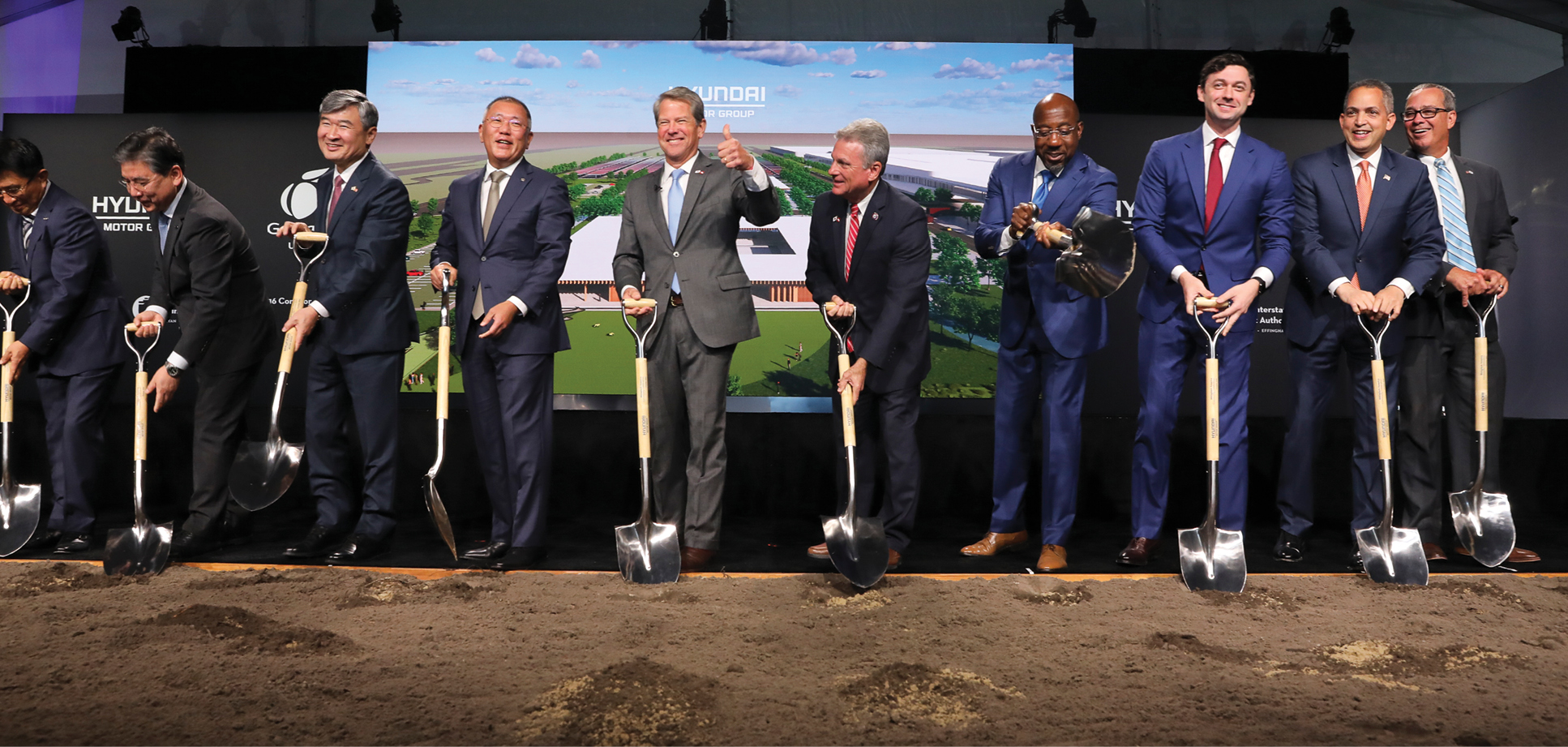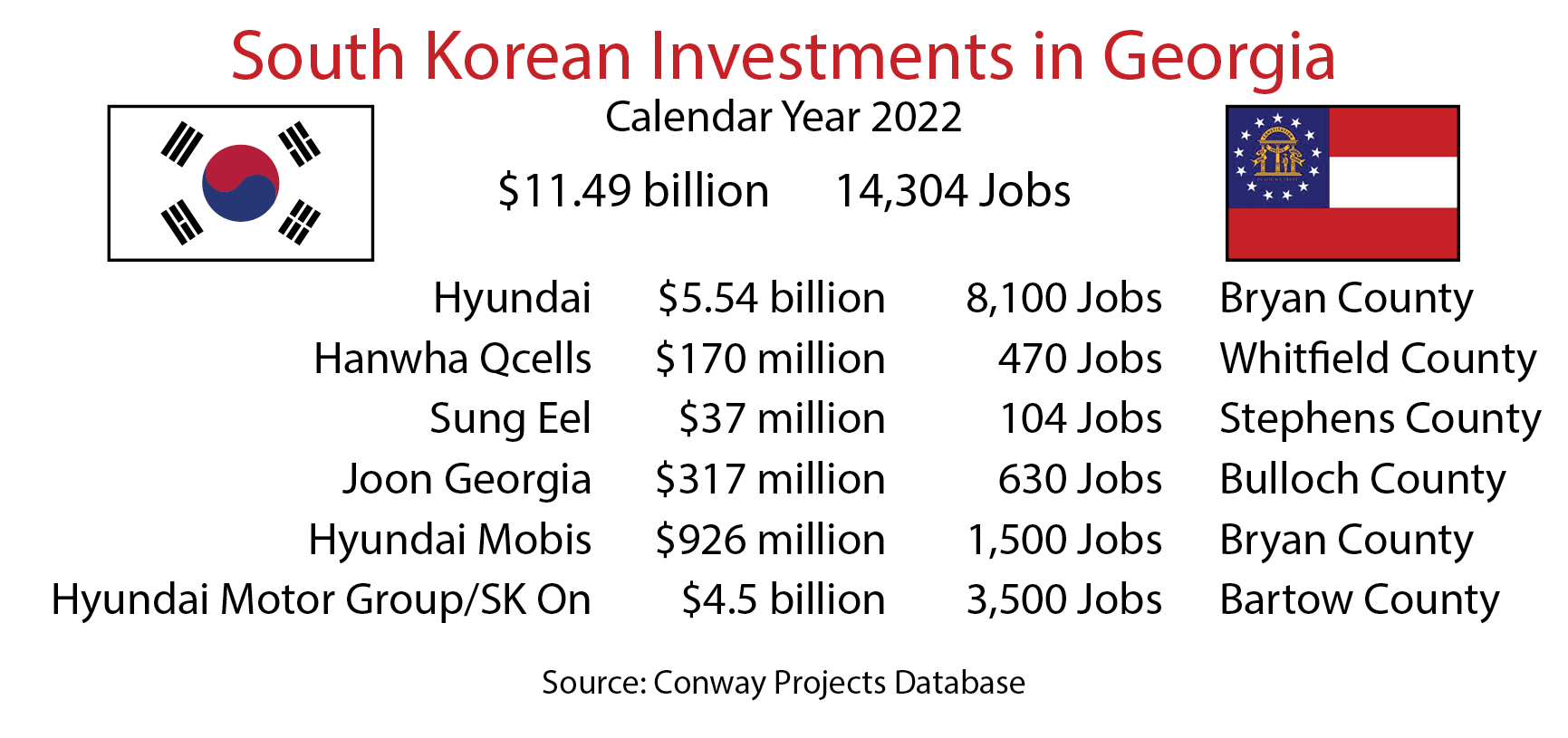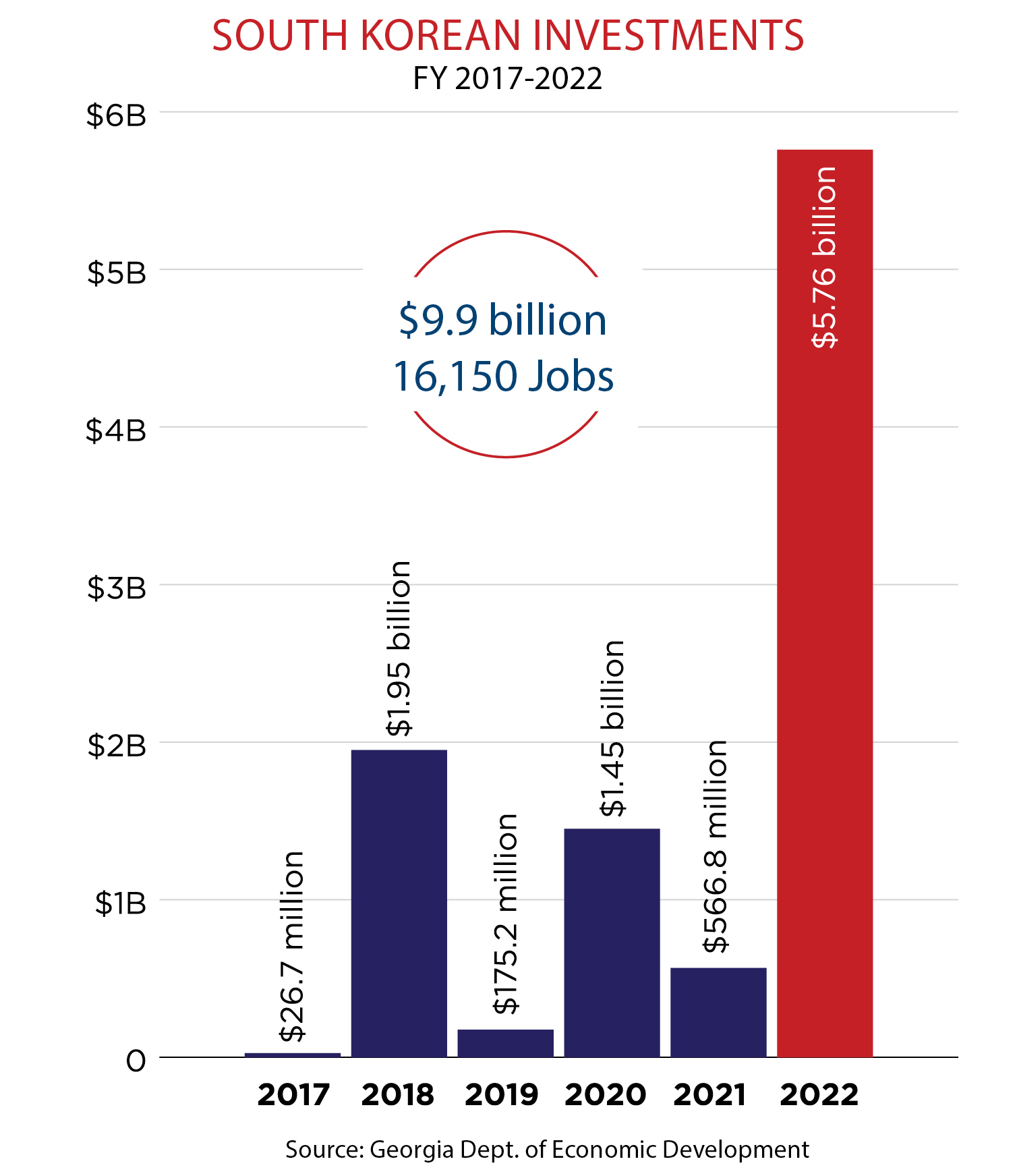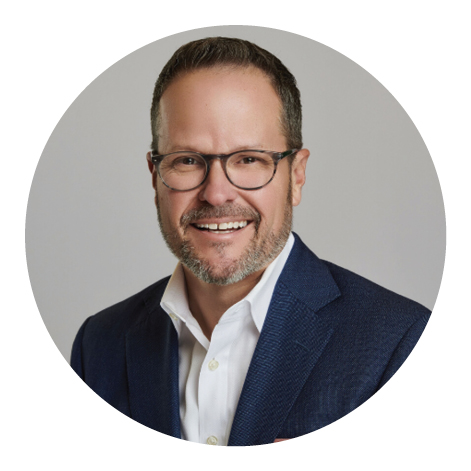On the evening of January 26, 2022, a corporate delegation representing an Asian automotive company, with a team of KPMG site consultants in tow, touched down near Savannah, Georgia for a blind inspection of the Bryan County Megasite, a 3,000-acre acre tract that had waited some years to land the type of transformational project these guests might deliver.
The pretense of “blind” apparently dropped, a member of the visiting cohort was spotted by the host team sporting a backpack stamped with the logo of Hyundai, the South Korean automotive giant.
And then, funny thing. Some off-the-cuff intelligence undertaken by Trip Tollison, president and CEO of the Savannah Economic Development Authority (SEDA), suggested quite strongly that the man with the backpack was none other than José Muñoz, Hyundai’s president and global COO.
“I got the phone rolling and figured it out,” Tollison tells Site Selection.
By all appearances, this Hyundai honcho was sending a signal.
“José’s attitude,” Tollison related in an interview in early February, “is that ‘we are Hyundai and we’re not going to hide that.’ He put it out there. That’s his style. We were high-fiving each other. We were, like, ‘This is it!’”
And, indeed, it was. Less than four months later, Hyundai Executive Chair Euisun Chung joined Georgia Gov. Brian Kemp in announcing plans for what is currently the biggest economic development project in Georgia history. Hyundai is to invest $5.54 billion in what the company calls “a state-of-the-art smart factory” for EVs and EV batteries at the Bryan County Megasite. Hyundai’s “Metaplant,” which is expected to deliver more than 8,000 jobs to the region, broke ground in October.
A Year That Smashed all Records
When Gov. Kemp delivered his State of the State address in January, his first shout-out was to Yoonie Kim, director of Korean investment at the Georgia Department of Economic Development (GDEcD). After a year in which South Korean investment in Georgia exploded, the gesture seemed more than appropriate.
“She has been instrumental,” Kemp told the State Assembly, “in bringing literally billions of dollars of investment and thousands of jobs to Georgia communities.”
Kim, who signed on with GDEcD in 2006, spoke with Site Selection just days before the Kemp call-out.

Hyundai broke ground on its Metaplant near Savannah in October.
Courtesy: georgia.gov
“Korean investment,” she says, “has been active ever since I joined the department, but it’s been really busy the last five years. For Korean companies, Georgia is the total package. With all the Korean companies that are investing here, it becomes a snowball effect.”
Data from Site Selection’s Conway Projects Database show that projects announced in Georgia by South Korean companies in calendar year 2022 totaled a staggering $11.49 billion. Georgia tracks data by fiscal year, which thus excludes a flurry of investments announced between July and January and accounts for state officials’ lower 2022 tally of $5.76 billion. Not included in the state’s total, for example, is the EV battery manufacturing facility announced in December by Hyundai Motor Group and SK On, a repeat investor in Georgia. Pegged at between $4 billion and $5 billion, the investment is to deliver more than 3,500 jobs to North Georgia’s Bartow County.
“With all the Korean companies that are investing here, it becomes a snowball effect.”
— Yoonie Kim, Georgia Dept. of Economic Development
While heavily weighted toward the EV space, South Korean activity also included several major clean energy projects, a trend that continued into 2023 with the blockbuster announcement by Hanwha Qcells of plans to invest $2.5 billion to expand solar module manufacturing with new facilities at two locations in northwest Georgia that are projected to create a combined 2,500 jobs. The Qcells facility in Dalton, which announced a $171 million expansion in 2022, already is considered the nation’s most prolific producer of solar panels.
The 2022 surge of investments serves to demonstrate how Georgia’s long-term courtship of Korean companies, which first paid off in 1996 when South Korea’s SKC established a polyester films plant east of Atlanta, has hit critical mass in the era of decarbonization.
“The most amazing advances and cutting-edge technologies right now are coming out of South Korea,” says Pat Wilson, GDEcD’s commissioner. “Whether you’re SK or Hyundai or Hanwha Qcells or any of a number of others, advances coming out of Korea are truly driving economic prosperity around the world. It’s exciting that Georgia’s relationship with Korea is so strong, because this is a pretty amazing point where we are today.”
Why Korean Companies Invest in Georgia
The “total package” Georgia offers to Korean manufacturers, says GDEcD’s Kim, includes low rates of unionization, low tax rates, prominent universities and workforce development programs, and logistics and transportation assets that include the Port of Savannah and Atlanta’s Hartsfield-Jackson International Airport, which offers numerous direct flights to Seoul each week. Atlanta, she adds, boasts the third-largest Korean-American population in the country and soon will pass New York.

Last year, South Korea’s trade and investment organization, KOTRA, opened an office in Atlanta, in the process signing a Memorandum of Understanding with GDEcD to continue to drive trade and investment between Korea and Georgia. Jeong-su Shin, director general of the Atlanta office, responded in early February to a list of questions submitted by Site Selection regarding Georgia’s attractiveness to Korean manufacturers. His responses expand upon Kim’s evaluation:
“Georgia grants a variety of tax benefits and incentives to investors and operates an investment office in Korea, where they support Korean companies with their needs. Organizations such as a recruitment support program help with the hiring procedure, making it easier for Korean companies to settle down.”
“The state of Georgia has been evaluated as one of the best locations to live in. Some characteristics that Koreans consider important when looking at a location are the prestigious educational environment, Korean grocery marts, Korean restaurants and Korean hospitals. Georgia carries all of them and acts as an ideal environment for Koreans to live in.”
“Another advantage of Georgia is that there are two direct flights a day from Seoul to Atlanta, making trips back home more convenient. The quick and easy services to help exchange driver’s licenses for Koreans is another reason why Georgia is comfortable and suitable to live in. As tens of thousands of Koreans are currently settled in Georgia there is no need to worry about your English skills or being lost.”
“When immersing yourself in Georgia an additional enjoyable characteristic is the weather, providing the best location for outdoor activities and meeting new people. All of these reasons provide the perfect environment for families to enjoy life in the U.S. Many potential Korean companies are already keeping an eye on those that have successfully invested in doing business in Georgia.”
The Kia Plant Is the Model
Since that first major investment in 1996, South Korea’s Georgia footprint has come to include more than 100 facilities that now employ some 9,400 Georgians, a number that’s set to dramatically expand. Wilson is among those who point to automaker Kia’s decision to build its first U.S. manufacturing plant in the town of West Point in 2006 as a milestone in the relationship. It’s no coincidence that the Georgia governor’s official vehicle is a Kia Telluride SUV, one of the models Kia builds in West Point and ships worldwide through the Port of Savannah.
“The Kia plant,” Wilson says, “is where all this exponential growth begins.”
Wilson believes, the workforce development program developed by the state through its acclaimed Quick Start training program resonated so strongly with Kia that word went out to other Korean manufacturers that Georgia is the place. As it will do for the coming Hyundai plant in Bryan County, the state built for Kia a dedicated facility to train its Georgia workforce.

“Before the ink was dry on Kia’s announcement to build our facility in Georgia,” Kia Georgia’s Rick Douglas recently told Site Selection’s Ron Starner, “the Technical College System of Georgia had dispatched its Quick Start program to create a world-class training program to prepare the community for the 3,000 automotive assembly jobs headed its way. Quick Start traveled the globe to make the Kia Georgia Training Center the ‘gold standard’ in the auto industry,” becoming, he said, “the starting line for the transformation from a local workforce focused on textiles to a high-tech automotive workforce.”
“We still work to train Kia’s employees as they continue to ramp up and change lines,” Wilson says. “It’s an ongoing example. The reputation of that company and the partnership with Georgia really translates well to all of these other Korean companies that are looking for some of the same services.”
How the Big Deal Went Down
All the same, the record $5.54 billion investment near Savannah that was announced last year by Hyundai did not come gift-wrapped, according to those on the Georgia side who helped make it happen. Plans for a megasite that could accommodate such a project go back eight years, and the road to Hyundai was not without bumps. Early on, Volvo passed on the Bryan County site, electing instead to set up shop in neighboring South Carolina.
Led by SEDA’s Tollison and Anna Chafin, CEO of the Development Authority of Bryan County, a coastal alliance of Bryan, Chatham, Bulloch and Effingham Counties came together as a Joint Development Authority (JDA) to realize the site as the lure for a transformational project.
“We all worked together,” Chafin tells Site Selection via email, “to market the property and our region to site consultants, obtain due diligence, draft a wetland permit and rezone the property. It wouldn’t have been possible without a team effort.”
A key moment came in 2021 when state officials supported the JDA’s purchase of the property, a “game changer,” says Tollison, that gave the JDA a speed to market advantage in its efforts to promote the site.
“We had people from the state practically living here for four months or five months while we tackled it together,” says Tollison. “I can’t tell you how many trips I had to make to Atlanta. It was a massive team effort. And don’t get me wrong, we had some tense moments.”
The payoff to those years of effort is massive. Much as the presence of Kia would eventually lure dozens of suppliers to West Georgia, an ecosystem devoted to supporting Hyundai’s Metaplant near Savannah is beginning to take shape. Within weeks of October’s groundbreaking, Hyundai supplier Joon Georgia announced plans for a $317 million facility near Statesboro in Bulloch County. Hyundai Mobis, another supplier, followed shortly thereafter with the announcement of a $926 million project in Bryan County.
At a ceremony marking Hyundai’s historic announcement last May, the JDA presented José Muñoz with a painting that commemorates the “blind” site visit at the start of 2022 that got the ball rolling. It depicts a man strolling alone after dark along Savannah’s iconic River Street. The figure is wearing a Hyundai backpack.
“I thought José was going to cry,” remembers Tollison.
Muñoz, says Tollison, hung the painting in his office. And, he says, he still wears the backpack.
Eggs & ISSUES

Governor Brian Kemp (left) and Chris Clark, President/CEO, Georgia Chamber of Commerce
Photo courtesy of Georgia Chamber of Commerce
“Eggs and Issues,” a gathering of corporate leaders and economic development officials from across the state of Georgia, drew a record crowd to the Georgia World Congress Center in January, where the annual ritual resumed after a COVID hiatus. The gathering traditionally precedes the yearly session of the Georgia General Assembly.
Appearing on stage with Chris Clark, the Chamber’s president and CEO, Gov. Brian Kemp was candid about some of the challenges facing the state, even after a year of record investment. Economic development, the governor acknowledged, is being constrained by a lack of affordable housing. Impediments, he lamented, are being erected by officials at multiple levels.
“We want people to live in communities where they work,” Kemp said. “I’m not saying we have all the answers.”
As the crowd filed out of the Congress Center’s main ballroom, Clark spoke with Site Selection about the year ahead.
Site Selection: A lot of the discussion here this morning could have occurred in 49 other states, chiefly some of the concerns expressed about workforce and housing. How do you get out front on those issues?
Chris Clark: Let’s back up a minute on workforce development. Pre-COVID, for every three job openings in Georgia, there was one person looking for a job. That improved during COVID. Now, we’re at one person for every two job openings, but this will be an issue for the next five to 10 years. Our focus is not just to bemoan that fact but to look at it as an opportunity to rethink education pipelines. We’ve also got to do a better job of getting people that are on the sidelines not working and getting them back into the workforce. That includes men and women that have been in prison and have served their time. It’s dealing with childcare issues to get women back into workforce. It’s retraining opportunities.
On the education side, our career pathways are outdated, and we’ve got to rethink them. One of the things that the Chamber is asking our State Board of Education to consider is that every student that graduates high school in Georgia has some real-world experience whether through an internship or apprenticeship and that every kid that graduates has some entrepreneurial training to give them a better idea of what it’s like in the real world.
What can a group such as the Chamber do to promote housing construction, which is another challenge for which there’s no magic bullet?
Clark: Research we’ve done says about 38% of the average home price in Georgia is tied up in government regulations, and so we’re going to ask local governments to reduce those and rethink zoning. It’s ridiculous to have zoning that prohibits vinyl siding, or zoning that says you can’t have a 2,000-square-foot home. Our state leadership and the Chamber all want to do something about it, so I feel pretty confident that we’ll move the needle this year, even if it’s something as simple as incentivizing home builders to build more affordable housing structures instead of those that cost $500,000-plus.
On incentives for specific projects, Georgia has recently awarded billion-dollar packages to both Rivian and Hyundai. Do you sense that the state is becoming more generous in that area?
Clark: No. I’ve been doing this for 25 years and we’ve never had the incentives that other states have had. And I don’t see any need — as the business community leader in the state — to move down that road as long as our incentives help level the playing field and keep us competitive. We’re not asking the General Assembly to pass more incentives but rather to maintain the system that we have. If it’s a good deal for Georgia and there’s local skin in the game and the business can create good high-paying jobs and good investment, then the state should do its part. We’ve never chased fly-by-night. We’ve never made hasty decisions. We’ve never been overly generous, as I’ve heard many site selectors tell me. We don’t need to because we’ve got the workforce, we’ve got the infrastructure and we’ve got a pro-business government that outpaces anybody in the country every year. What’s so unique in Georgia — and my peers in other states bemoan the fact — is that when it comes to economic development, Democrats and Republicans work together here. In a lot of states, they don’t.

Chris Clark, President/CEO Georgia Chamber of Commerce
What accounts for Georgia’s remarkable surge in EV investments?
Clark: It starts with our business climate. Businesses like that we were the first to open after COVID and that we’re focused on job creation, low taxes and improving infrastructure. On workforce development, with Georgia Tech, the University of Georgia, Emory, Georgia Southern and other higher ed institutions they know they can get the engineers they want and they know that our technical colleges can handle the uplift on worker readiness. As far as location, these projects need large sites in rural areas that have easy access to population centers, and it’s hard to find large acreage tracts that meet these requirements. So, four of them are going into the “outerburbs” of Atlanta and the other outside of Savannah. Finally, many of those companies, like Qcells, are Korean. Georgia has a 40-year history of building relationships and partnerships with Korean companies. They feel connected to Georgia, they like our culture, our business climate and how we do business. That matters.
When looking at the state economy, is it fair to think of Atlanta and Savannah… and then all the rest?
Clark: I think you could have made that argument 10 years ago. But if you look at southwest Georgia and the number of investments that have gone into there in the last five years, it’s completely changed many of those communities, whether it’s Bainbridge, Thomasville, Albany, Moultrie or Tifton. We also see development coming inland from Savannah to as far as Dublin, and we hope it spreads north from there. Augusta’s economy is incredible with cybersecurity, the military and manufacturing. And now you’re watching north Georgia transform. So, I do think Atlanta and the coast are obviously engines in the state, but we’re seeing incredible economic growth in every corner of Georgia. Eighty percent of the announcements last year were outside of metro Atlanta, so that speaks for itself.
A lot of the jobs that are coming to rural parts of the state are manufacturing jobs. What about agriculture, which is what Georgia was built on? Is there a place for growth in precision ag?
Clark: Yeah, I think so. And that’s what the University of Georgia and our friends at ABAC [Abraham Baldwin Agriculture College in Tifton] are really focused on now. There is a lot we can do there. You’re going to see some fairly dramatic changes in agriculture over the next 10 years. Obviously more precision ag, but also as things get hotter we’re going to start changing crops. You’ll start to see more vegetables grown in South Georgia than we’ve ever seen before. We’re already starting to see some citrus popping up there. So, there are tons of opportunities, and we’re bullish on it. There’s always more you can do.

